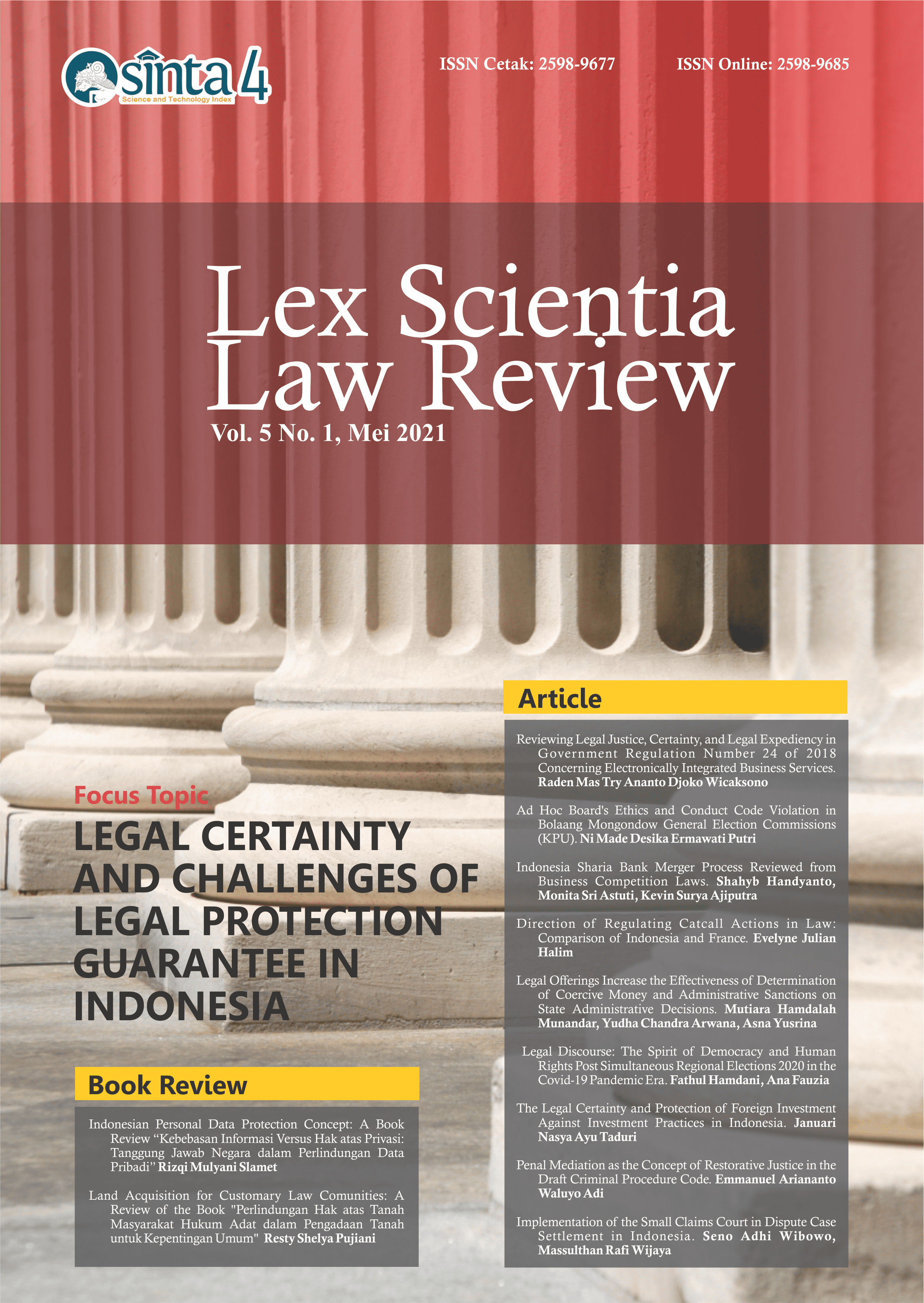Legal Offerings Increase the Effectiveness of Determination of Coercive Money and Administrative Sanctions on State Administrative Decisions
Main Article Content
Abstract
Legal Offers In Improving the Effectiveness of Forced Money Determination Efforts and Administrative Sanctions On the warning of a valid verdict that is not carried out by the defendant. The assessment of the formulation of the problem in this study is how the legal culture in Indonesia to the application of Article 116 paragraph (4) of Law No. 51 of 2009 on State Administrative Justice. In this paper the author also provides an understanding of the comparison of the State Administrative Law system (Indonesia) with Verwaltungsgerecht (Germany) in order to realize legal justice for the community. By using paradigms in terms of epistemological and axological aspects. In the implementation has not been found a special authority in overseeing the existence of the State Administrative Decision (KTUN) that has been validly decided by the judge, there are still some cases of defendants who do not carry out the warning of the verdict against the verdict. The defendant must pay forced money or administrative sanctions against it. From these cases, there should be special authority in supervising the KTUN that has been decided by the judge. The author in this paper offers a legal offer to improve the effectiveness in the implementation of the KTUN in improving legal certainty and guarantee of legal protection in the field of State Administrative Justice. The authors of this paper use descriptive doctrinal research methods, descriptive legal research that explains what should be communicated with the law in the review of das sollen and das sein.
Article Details
All writings published in this journal are personal views of the authors and do not represent the view of this journal and the author's affiliated institutions. Authors retain the copyrights under this license, see our copyrights notice.
References
Basah, S. (1988). Eksistensi don Tolok Ukur Badan Peradilan Administrasi di lndonesia. Bandung: Alumni.
Darmika, I. (2016). Budaya Hukum (Legal Culture) dan Pengaruhnya Terhadap Penegakan Hukum di Indonesia. Jurnal Hukum tô-râ, 2 (3), 5.
Djalali, M. A. (2015). Filsafat Ilmu: Suatu Pengantar. Bandung: Alumni.
Friedman, L. M. (1984). American Law: An Introduction. New York: WW Norton & Co.
Friedman, L. M. (1969). On Legal Development. Rutgers Law Review, 24 (1), 225.
Habibi, D. (2019). Perbandingan Hukum Pengadilan Tata Usaha Negara dan Verwaltungsgerecht Sebagai Perlindungan Hukum Rakyat. Kanun Jurnal Ilmu Hukum, 21 (1). 16.
Imaniyati, N. S. (2003). Pengaruh Paradigma Positivisme Terhadap Teori Hukum Dan Perkembangannya. 19 (3).
Lask, Radbruch, & Dabin. (1950). The Legal Philosphies of Lask, Radbruch, and Dabin. Translate by Kurt Will, etc. Massacilusetts: Harvards University press, Cambrigg.
Makmur, S. (2015). Budaya Hukum Dalam Masyarakat Multikultural. Salam; Jurnal Sosial dan Budaya Syar’i, 2 (2), 284.
Maridjo. (2016). Pengawasan Peradilan Tata Usaha Negara Terhadap Keputusan Tata Usaha Negara Dalam Mewujudkan Pemerintahan yang Baik. Semarang: Universitas, Semarang.
Muhadjir, N. (2001). Filsafat Ilmu: Positivisme, Postpositivisme, dan Postmodernisme. Yogyakarta (ID): Sarasin.
Hukum Online. (March, 2009). “Procedures for Implementing Compulsory Money and Administrative Sanctions at PTUN (Thought Contribution)”, Hukum Online, March 19, 2021, accessed from https://hukumonline.com/berita/baca/hol21127/tata-cara-pelaksana-uang-paksa-dan-sanksi-administrative-di-ptun-sumbangan-pemikiran.
The Republic of Indonesia. (2014). Law Number 30 of 2014 concerning Government Administration.
The Republic of Indonesia. (1986). Law Number 5 of 1986 concerning State Administrative Courts.
The Republic of Indonesia. (2009). Law Number 51 of 2009 concerning State Administrative Courts.
Salmon, H. (2010). Eksistensi Peradilan Tata Usaha Negara (PTUN) Dalam Mewujudkan Suatu Pemerintahan Yang Baik. Jurnal Sasi, 16 ( 4 ), 18.
Sesse, M. S. (2013). Budaya Hukum dan Implementasinya Terhadap Pembangunan Hukum Nasional. Jurnal Hukum Diktum, 11 (2), 172.
Shidarta. (March, 2019). “What is Legal Culture ?”, Binus University Faculty Of Humanities, March 23, 2021, accessed from https://business-law.binus.ac.id/2019/10/04/apa-itu-budaya-hukum/.
Sudiyana & Suswoto. (2018). Kajian Kritis Terhadap Teori Positivisme Hukum Dalam Mencari Keadilan Substantif. Jurnal Ilmiah Ilmu Hukum QISTIE, 11 (1), 107.
Taufiq, M. (2014). Keadilan Substansial Memangkas Rantai Birokrasi Hukum, First Edition. Yogyakarta: Pustaka Pelajar.
Tista, A. (2015). Implikasi Pengawasan Terhadap Produk Hukum Yang Berbentuk Keputusan Tata Usaha Negara Melalui Peradilan Tata Usaha Negara (Analsis Politik Hukum Terhadap Undang-Undang Nomor 5 Tahun 1986 Junto UndangUndang Nomor 9 Tahun 2004 Junto Undang-Undang Nomor 51 Tahun 2009 Tentang Perubahan Kedua Undang-Undang Peradilan Tata Usaha Negara). Al Adl’, 7 (13), 6.
Umanailo, M Chairul Basrun. (2016). Positivisme- Positivisme- Post Positivisme. Jurnal Filsafat Hukum Universitas Indonesia Vol 3.
Wahana, P. (2016). Filsafat Ilmu Pengetahuan. Yogyakarta (ID): Pustaka Diamond.
